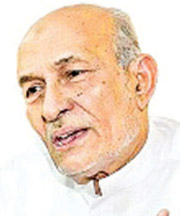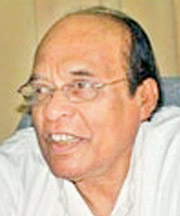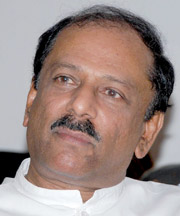LG Reforms Bill to eliminate preferential vote battle
By Shanika SRIYANANDA
Several senior politicians in the UPFA condemned the use of
'money-power' to eliminate political rivals in the preferential race, in
the aftermath of SLFP stalwart Bharatha Lakshman Premachandra's killing
in Kolonnawa, emphasising the urgent need for electoral reforms to do
away with this evil system that brings in 'moneyed criminals' to
Parliament.
 Minister Dinesh Gunawardena who is the Chairman of the Parliamentary
Select Committee on Electoral Reforms, pointed out the need for an early
consensus over the proposed recommendations which are now before
Parliament and which had been unnecessarily delayed due to minute
issues. Minister Dinesh Gunawardena who is the Chairman of the Parliamentary
Select Committee on Electoral Reforms, pointed out the need for an early
consensus over the proposed recommendations which are now before
Parliament and which had been unnecessarily delayed due to minute
issues.
Excerpts from the interview:-
I was the Chairman of the Parliamentary Select Committee on Electoral
Reforms of the last Parliament as well as the previous Parliament. There
was a consensus of political parties in Parliament to change the present
election system doing away with preferential voting and going into a
mixed system where the First- Past-the-Post system receives majority 70
per cent and 30 percent to be under PR.
The Government has already presented the Local Government Reforms
Bill in Parliament. The Parliament passed the Second Reading and the
bill is now at the committee stage. In view of the recently concluded
elections it was not taken up.
I hope going along with the thinking of the broad masses and
political parties, a consensus will be reached in Parliament and the
Bill will be passed as early as possible.
When the new laws are introduced we can do away with the preferential
voting and re-demarcate wards in the Local Governments for future
elections.
Preferential voting definitely has created an unpleasant situation in
relation to both the voter and the elected, as well as those standing
for election. One has to work far away from one's place which demands
heavy expenses and rivalry which otherwise may be minimised. Money also
brings violations of the election laws and abuse of 'money-power' was
seen during the 30 years of PR. work far away from one's place which demands
heavy expenses and rivalry which otherwise may be minimised. Money also
brings violations of the election laws and abuse of 'money-power' was
seen during the 30 years of PR.
The first step of reforms will cover Local Government polls, followed
by reforms in the provincial and parliamentary elections. An elected
member would be able to cater to a small area bringing better results.
This will change the culture where the candidate has to bear huge
expenses due to travel beyond one's locality.
This system also has been discriminative towards women and
professionals entering politics. It has been a negative feature for a
vibrant democracy.
The final recommendations of the Parliamentary Select Committee
include provisions to get national level nominations to be made under
different categories, in order to compensate for the 'National List'
which will be scrapped following the new laws. The aim is to get more
women and representation of academia and outstanding statesmen in
Parliament. The first-past-the-post system will pave way for such people
to enter politics.
The recommendations have already been presented in Parliament. The
second reading of the Bill has already been made and now it is in the
committee stage.
Only the final vote is pending for which opposition parties must
extend their support rather than complain on minute issues. As a result
of unnecessary issues this important piece of legislation has been
delayed for too long. If not this would have gone through Parliament six
months ago.
This Kolonnawa incident first and foremost relates to the
preferential race, secondly on the role of the Police in maintaining law
and order and it also rejects directly the powers of the Elections
Commissioner.
It rejects the election laws, powers of the Commissioner implemented
through his respective offices and law and order offices mainly the
Police. What happened in Kolonnawa, 'perhaps' would have been brought
under control by the police if they took action from the early polling
hours.

General Secretary of the Communist Party and Human Resources Minister
Dew Gunasekera too emphasised the need for bringing in immediate changes
to the 'evil' preferential voting system. He is a former Minister of
Constitutional Affairs and a member of the Parliament Select Committee
on Electoral Reforms.
He said:
Minister Dinesh Gunawardena's committee has produced a report with a
combination of the first-past-the-post system and proportional
representation. But some minority parties earlier expressed reservations
over the election of their members to Parliament. That is why it was
held up. Now there is a fresh proposal and this is now before
Parliament.
The minority parties have not been overlooked under the proposed
election laws. They still have a good chance of getting their members
elected. The proportional representation system has not been completely
done away with.
We are striving to get a national consensus. These are national
issues and we want the opposition to be party to this. We don't want to
shut them out. This should not be a one party legislation. But by and
large I think it will be easy to reach a consensus in Parliament" on the
legislation that is before the House. Particularly after this Kolonnawa
tragedy, there is re-thinking on the part of the political parties.
To curb violence related to polls, I don't think electoral reforms
alone will provide a solution. The whole political culture needs to
undergo a change. The violence has crept in due to a number of factors.
After the opening of the economy, there was a free flow of 'black
money'. This 'black money' is one of the major causes contributing to
violence.
The people with 'black money' want to grab power. There is a large
number of individuals who have entered politics with the influence of
their money. They are the persons who are creating all these problems.
Such incidents were unseen in earlier times.
The Kolonnawa incident was not a mere inter party struggle. It was
not a culmination of a preferential vote struggle.
It was something more than that. When politicians misusing power and
arms bring along thugs to confront their political rivals, such
unfortunate things happen. The use of such terrible force in a mini
election was unheard of in our election history.
The candidate, who secured the highest number of votes in the
Kolonnawa PS, was not even allowed to go out of his house. He was
virtually under house arrest during the campaign. But luckily the people
gave him 43,000 preferences, the highest ever in history.
The people silently responded. That was a good eye-opener to
immediately implement electoral reforms. This was also a lesson taught
for those who try to win elections with force and tactics of thuggery.
Violence persisted in Sri Lanka's polls history right throughout but
at a low level. There were no incidents of organised crime. It has
become unprecedented now. These people get state arms and use civilians.
That is why the Government immediately decided to collect all weapons
used by VIPs.
The electoral system also contributed. The political culture also
contributed. Then black money swept the elections here.
These individuals spent millions of rupees on the recently concluded
local polls. Why are they spending so much to misuse the PS offices to
get contracts. This incident goes beyond mere political rivalry.
Western Province Governor and former Minister and trade union
activist Alavi Moulana said:
"The first and foremost thing the President must do is to take
control of the whole situation and bring in laws to do away with the
Preferential system. This is the need of the hour. There is a huge
outcry from the masses and the political strata for the President to
take the leadership on this issue.
The killings among own party members are a disgrace. I don't know how
I will recover from the shock of the death of Bharatha Lakshman
Premachandra. What is this society becoming ? How could anyone deprive
the country of a person of that calibre ? It was just terrible.
He was a trade union leader and I had worked with him for the past 30
years. He is above petty party politics. He was a bridge between the
minorities and the majority and the poor and the rich.
The misuse of power to eliminate people must be stopped at any cost.
Petty political divisions must be totally condemned." |

